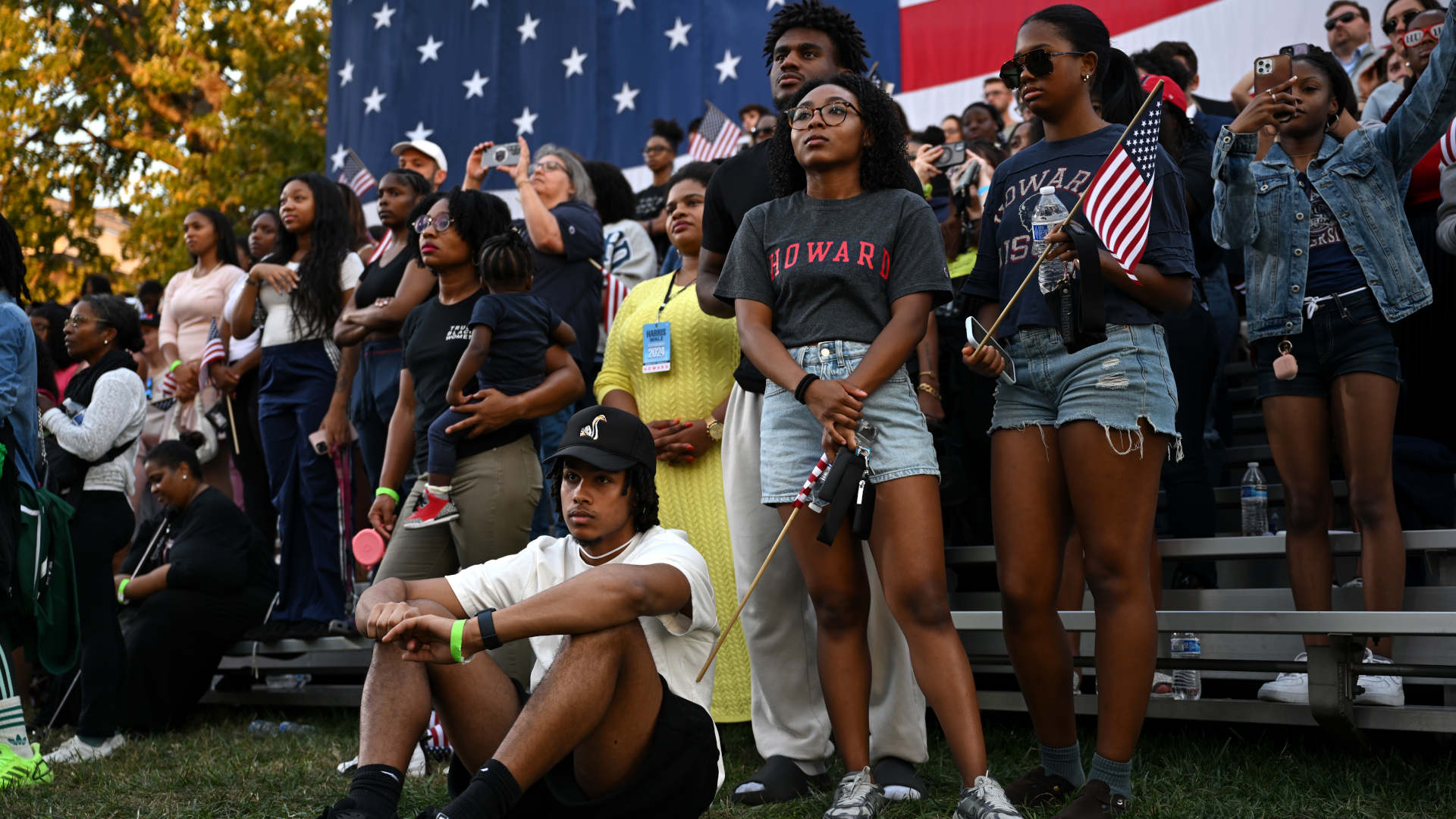In January 2021, I was in my last year of medical school and applying for a residency. During one interview with a program, I asked a resident how the pandemic had affected his medical training, especially as a Black man. He began to cry. Every patient in his hospital’s ICU had Covid-19, and they were all Black. Soon after, I started residency at another hospital and witnessed firsthand the devastating toll Covid-19 had on Americans, predominantly Black and Hispanic communities. The pandemic dominated the news in 2020 and was a significant issue during and after that year’s U.S. presidential election.
This year, one election cycle later, news mentions of Covid-19 and the havoc it wreaked on people in the U.S. — especially on racial minorities — seemed rare. In post-mortem analyses of the Democrats’ presidential loss in mainstream media, little has been said about the pandemic’s impact. However, neglecting the topic of health care, especially health care inequality, during the campaign may have cost Democrats the White House. Doing so in future elections will continue to be a risky strategy, if not a losing one.
Between 2020 and 2023, nearly 1.3 million more Americans died than expected. These people were disproportionately Hispanic, Black, and Native American, with the overwhelming majority dying of Covid-19. A recent study found that among young people, Black Americans accounted for over 50 percent of excess deaths despite comprising less than 14 percent of the population. The past few years have been traumatic, and health care has been a top concern for voters. Yet many felt that health care didn’t receive enough attention in the campaign discourse. Polls showed increased support for Donald Trump among Black voters, especially Black men. Scant attention has been given to how much this shift might be due to health-related concerns and the lasting impacts of the pandemic and its associated health crises.
I trained in internal medicine and primary care during the pandemic. I treated Covid-19 patients in various settings and stages of illness, and I’ve been studying and writing about the opioid epidemic since 2016. I believe that many Black Americans who might have supported Kamala Harris in this election died prematurely — either from Covid-19 or opioid overdoses — which has weakened the Democratic electorate. While this might seem far-fetched, preventable deaths tied to systemic inequalities can indeed shape the electorate in consequential ways. A study found that of 2.7 million Black Americans who died prematurely due to inequality between 1970 and 2004, 1.7 million would have been of voting age past 2004, with most of them likely to have supported Democrats.
This election’s exit polls showing increased support for Trump among Black men may partly reflect a form of survivor bias. Black men, who were more vulnerable to Covid-19 and overdose deaths, were underrepresented in the voter pool. Indeed, while the media covered racial disparities in Covid-19 incidence and mortality widely, not as much coverage was given to the specific burden among Black men. For example, a colleague and I analyzed nine months’ worth of Michigan’s Covid-19 data to look at disparities in disease incidence and mortality. We found that the gaps between Black people and White people shrunk at roughly the same rate for men and women over time. Still, the gaps remained worse among men, underscoring Black men’s unique vulnerability.
One study found that of 2.7 million Black Americans who died prematurely due to inequality between 1970 and 2004, 1.7 million would have been of voting age past 2004.
Beyond Covid-19 deaths, we saw other conditions affected: Opioid overdose deaths among Black men surged dramatically. In 2020, the overdose death rate for Black Americans surpassed that of White Americans, with the rise concentrated almost entirely among older Black men over 55. The social conditions of the pandemic — including disruptions to health services, increased isolation, and economic devastation — likely exacerbated overdose deaths, adding yet another layer of mortality and loss to Black communities.
What’s more, the so-called unwinding of Medicaid effectively discouraged millions of those who survived the pandemic from voting. Medicaid, the largest public health insurer, covers more than 79 million low-income Americans, with racial minorities disproportionately represented. Perhaps surprisingly, research over multiple elections from 2008 to 2014 has shown that Medicaid expansion can increase voter turnout, especially for men and in Democratic counties.
During the pandemic, the Democratic-led Congress mandated that Medicaid beneficiaries remain enrolled continuously. However, the Consolidated Appropriations Act of 2023 waived this requirement after Republicans won control of the House of Representatives, even though the health crisis was still ongoing. The mandate for continuous enrollment had driven a surge in Medicaid participation. Since the unwinding began, experts estimate that some 8 to 24 million people risk losing coverage. Those losing coverage are disproportionately young and Black — voter demographics that could have made a crucial difference for Democrats in this year’s election.

For all of Undark’s coverage of the global Covid-19 pandemic, please visit our extensive coronavirus archive.
A 2023 survey revealed that many Medicaid beneficiaries, especially those aged 18 to 29, had not renewed their coverage. In this age group, Harris saw a relative decrease in percentage of votes compared with the number Joe Biden received in 2020. The Medicaid unwinding resulted in a 17 percent relative decrease in enrollment nationwide between 2023 and 2024. This enrollment decrease was about the same or worse than the national average in critical swing states like Georgia, Michigan, Wisconsin, and Pennsylvania.
Trump spent his first presidency trying to dismantle the Affordable Care Act, which was signed into law in 2010, and included Medicaid expansion as one of its most significant accomplishments. In the 2016 presidential election, greater insurance coverage rates correlated with an increase in Democratic vote share compared with in 2008. This is likely because people who feel supported by government programs, and thus by those in charge, are more likely to participate in the electoral process. Alas, young voters, Black voters, and men — all groups disproportionately affected by the Medicaid unwinding or sensitive to improvements in insurance coverage — are the groups that had the most consequential relative decrease in voter turnout in 2024 compared with 2020, according to an analysis by The Washington Post.
To be sure, the Biden-Harris administration has delivered some health care wins. Capping out-of-pocket insulin costs for seniors and empowering Medicare to negotiate medication prices are notable improvements. Voter turnout for seniors increased, with significant gains for Harris, who earned 49 percent of their vote, closing the 7-point advantage Trump had over Biden in 2020. However, younger, low-income voters — half of whom are on Medicaid — might not feel like beneficiaries of these wins. Harris missed an opportunity to amplify these victories as part of a larger vision to expand benefits, framing them as the foundation for a more inclusive health care system.
Research over multiple elections has shown that Medicaid expansion can increase voter turnout, especially for men and in Democratic counties.
For example, she could have proposed lowering the Medicare eligibility age to 50, a pragmatic step that would not have alienated centrist voters wary of Medicare for All. Such a proposal could have also been seen as a form of economic relief for those workers who don’t qualify for enough health insurance subsidies under the ACA and who spend disposable income on health care. A 2023 survey from the Commonwealth Fund found that nearly one-third of Americans with private insurance and two in five with Medicaid found it harder to pay for food and other household bills because of health care costs. By addressing these costs, Democrats could have simultaneously tackled a significant worry for many Americans during this election: the economy.
Health care inequality shapes U.S. society, placing Democrats at a structural disadvantage. The Covid-19 pandemic and its aftermath have only intensified this effect. These past four years saw minority communities devastated by preventable deaths. This reality has altered the electorate in tangible ways. In 1966, Reverend Martin Luther King Jr. famously said, according to Cleveland’s Call and Post, “Of all forms of discrimination and inequalities, injustice in health care is the most shocking and inhuman.” This still resonates today. For future elections, Democrats must adopt a compelling vision for a healthier, more equitable America. By prioritizing health care reform, Democrats can rally an electorate deeply affected by health and economic crises. Health care should be at the forefront of their platform — if they want to win.
Max Jordan Nguemeni, M.D., M.S., is an assistant professor of general internal medicine and health services research at the University of California, Los Angeles, where he conducts health policy research. He writes the Substack Column “Adverse Reaction” about culture, politics and health. He can be found online at X and Bluesky.











